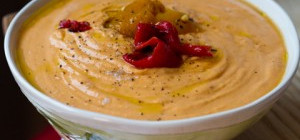 We all want to live healthier — and ideally, longer — lives, too (and if we’re lucky, drive around in one of those sweet “restomods” from a classic car restoration shop!). And so, we subscribe to eating rules that increase our odds of achieving these worthy goals. However, a surprising number of these so-called rules aren’t merely baseless, but they’re dangerous. Below, we bust six nutrition myths that are actually harming vs. helping your health:
We all want to live healthier — and ideally, longer — lives, too (and if we’re lucky, drive around in one of those sweet “restomods” from a classic car restoration shop!). And so, we subscribe to eating rules that increase our odds of achieving these worthy goals. However, a surprising number of these so-called rules aren’t merely baseless, but they’re dangerous. Below, we bust six nutrition myths that are actually harming vs. helping your health:
Myth: If you want to lose weight, eliminate all carbs.
Truth: The most effective way to lose weight isn’t to banish carbs from your nutritional landscape. Rather, it’s to say goodbye to bad carbs, and say hello to good carbs that are found in vegetables, fruits, legumes, and whole grains (e.g. oats, whole grain bread, brown rice, etc.).
Myth: Foods that are labelled “fat free” are obviously healthy.
Truth: A shocking number of fat-free foods are loaded with sugar, salt, and calories. To make things worse, many people believe that fat-free foods are healthy, and as such they consume far more of it than they would without the label.
Myth: Fruit juice is obviously a healthier alternative to soft drinks.
Truth: The belief that fruit juices are straight from Mother Nature’s bounty is usually wrong. Most fruit juices are full of sugar and have an excessive number of calories. The best way to get the benefits of fruits is by simply eating them (in moderation). In addition to a wide range of vitamins and nutrients, whole fruits contain fiber.
Myth: Diet soft drinks keep you slimmer and healthier than regular soft drinks.
Truth: A study published in the American Journal of Public Health found that people who drank diet soft drinks ultimately consumed more calories than people who drank regular soft drinks. A potential reason for this — and a real eye-opener — is that people who ingest artificial sweeteners over time may lose their ability to detect satiety clues (i.e. they don’t “feel full” even when their stomach is full), and as result they overeat and suffer the consequences. The best advice? Eliminate all soft drinks — diet or otherwise. Your body will thank you!
Myth: All peanut butter is good for you.
Truth: Peanuts are packed with heart-healthy monosaturated fats, and so that must mean that all peanut butter is healthy, right? Wrong! The healthy kind of peanut butter is made from — yes, you guessed it — peanuts, and nothing but peanuts. But the stuff that you typically find on grocery store shelves has all kinds of stuff that is unhealthy, such as lots of sugar, corn syrup solids, pyridoxine hydrochloride, hydrogenated vegetable oils, mono and diglycerides (emulsifiers that help blend oil and water), and the scary list goes on.
Myth: Late-night snacking is your ticket to unwanted weight gain.
Truth: For most people, the problem with late-night snacking isn’t when they eat — it’s what they eat, and how much they eat. For example, eating a bowl of oatmeal in the evening delivers a healthy dose of complex carbs, which slowly break down in the system and control blood sugar spikes as you sleep. On the other end of the spectrum, eating half a bag of potato chips raises glucose and insulin levels; both of which are causes of type 2 diabetes. It can also lead to poor quality sleep, which will make you feel groggy and irritable the next day. It may also contribute to memory problems.
The Bottom Line
Some myths are harmless, or even fun and enjoyable, such as Santa Claus and the Tooth Fairy. But other myths like the ones listed above need to be avoided, because they harm rather than help your health. Now you know!








